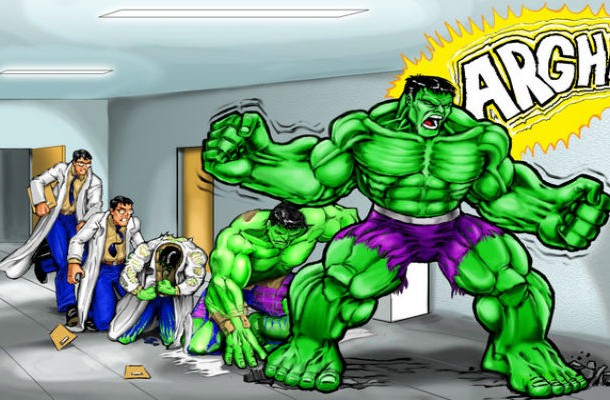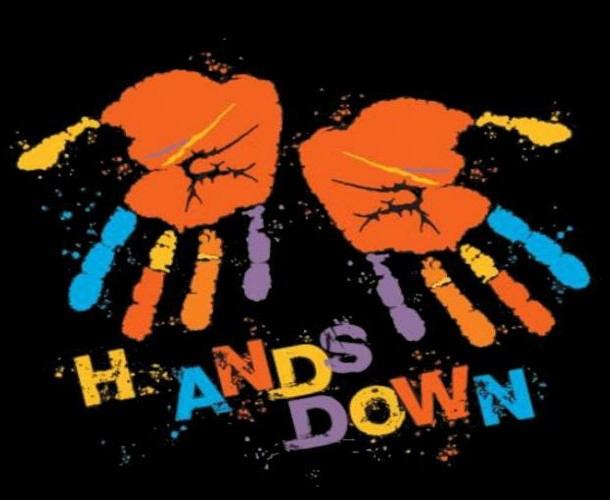25 Startling Origins Of Popular Idioms!
Peter Pizagalli
Published
12/17/2014
Ironically even the term idiom isnt an English word but derives from the Greek for one of a kind. Before we give too much information and ruin it for you, here are 25 widely used and popular idioms accompanied by their meaning and origin. Its time to learn and know what were talkin about, right?
- List View
- Player View
- Grid View
Advertisement
-
1.
 Even though this phrase has several different meanings nowadays, the oldest of them is the one you will usually hear when someone loses control of things or a situation. According to Morris Dictionary of Word and Phrase Get out of hand-Origins by William and Mary Morris, this expression goes back to the old days when failure to keep a firm grip on the reins would result in a team of horses getting out of hand.
Even though this phrase has several different meanings nowadays, the oldest of them is the one you will usually hear when someone loses control of things or a situation. According to Morris Dictionary of Word and Phrase Get out of hand-Origins by William and Mary Morris, this expression goes back to the old days when failure to keep a firm grip on the reins would result in a team of horses getting out of hand. -
2.
 Make the grade-This idiom is kind of revealing really and has no hidden meanings since it simply suggests that one has to reach the required standard to enter a university or get a job and so on. The more impressive thing about this phrase, however, is that it has nothing to do with taking exams as most of us would think.The word grade is short for gradient and the idiom derives from railroad construction in nineteenth-century America. Back in the non-high-tech age of the nineteenth century, calculations had to be carefully made to ensure engines didnt encounter sudden steep gradients and this is how we ended up with make the grade.
Make the grade-This idiom is kind of revealing really and has no hidden meanings since it simply suggests that one has to reach the required standard to enter a university or get a job and so on. The more impressive thing about this phrase, however, is that it has nothing to do with taking exams as most of us would think.The word grade is short for gradient and the idiom derives from railroad construction in nineteenth-century America. Back in the non-high-tech age of the nineteenth century, calculations had to be carefully made to ensure engines didnt encounter sudden steep gradients and this is how we ended up with make the grade. -
3.
 Sick as a dog-Even though dogs appear to physically and mentally deal with sickness way better than humans this idiom refers to someone whos very sick. The origin of the phrase comes from the early 1700s when it was common to call someone who was undesirable and ill-looking a dirty dog.
Sick as a dog-Even though dogs appear to physically and mentally deal with sickness way better than humans this idiom refers to someone whos very sick. The origin of the phrase comes from the early 1700s when it was common to call someone who was undesirable and ill-looking a dirty dog. -
4.
 No-brainer-We use this idiom to describe a very easy decision we make for anything that requires minimal brain activity to accomplish. This phrase has been widely used only for the past five or six decades and one of the earliest sources we have for it comes from an issue of the Lethbridge Herald of 1968, in which the following was stated about an ice hockey coach: Hed break in on a goalie and the netminder would make one of those saves that our manager-coach, Sid Abel, calls a no-brainer.
No-brainer-We use this idiom to describe a very easy decision we make for anything that requires minimal brain activity to accomplish. This phrase has been widely used only for the past five or six decades and one of the earliest sources we have for it comes from an issue of the Lethbridge Herald of 1968, in which the following was stated about an ice hockey coach: Hed break in on a goalie and the netminder would make one of those saves that our manager-coach, Sid Abel, calls a no-brainer. -
5.
 To hit the nail on the head-We often hear this idiom during intense conversations and especially when someone gets right to the precise point or says something that is verified as correct. However, no one can be sure about its exact origin but what we know for a fact is that this phrase is really old.It appears for the first time in recorded history in 1438 in The Book of Margery Kempe, even though many scholars believe that the idiom in Kempes book isnt entirely clear and probably has a different meaning from its modern use
To hit the nail on the head-We often hear this idiom during intense conversations and especially when someone gets right to the precise point or says something that is verified as correct. However, no one can be sure about its exact origin but what we know for a fact is that this phrase is really old.It appears for the first time in recorded history in 1438 in The Book of Margery Kempe, even though many scholars believe that the idiom in Kempes book isnt entirely clear and probably has a different meaning from its modern use -
6.
 The best of both worlds-The phrase the best of both worlds refers to an item or situation that offers the benefits of two disparate or competing items or situations, often without presenting the undesirable aspects of either. To make a long story short, it means that you can enjoy two different opportunities at the same time. Even though the exact origins of the term are unconfirmed, the phrase has been a part of English since at least the late 1800s. It is believed to have derived from the saying the best of all possible worlds, which was used in Voltaires novella Candide, published in 1759, but the modern definition of the idiom usually compares only two situations as opposed to the broader comparison implied by Voltaire.
The best of both worlds-The phrase the best of both worlds refers to an item or situation that offers the benefits of two disparate or competing items or situations, often without presenting the undesirable aspects of either. To make a long story short, it means that you can enjoy two different opportunities at the same time. Even though the exact origins of the term are unconfirmed, the phrase has been a part of English since at least the late 1800s. It is believed to have derived from the saying the best of all possible worlds, which was used in Voltaires novella Candide, published in 1759, but the modern definition of the idiom usually compares only two situations as opposed to the broader comparison implied by Voltaire. -
7.
 Break a leg-This really weird-sounding idiom is mainly used when you want to wish someone good luck and it was first used by stage actors who were known for being very superstitious. Although there are many different theories about the origin of break a leg and no one can be one hundred percent sure, the most accepted theory today suggests that break a leg was heard for the first time in British theater circles back in the 1920s.
Break a leg-This really weird-sounding idiom is mainly used when you want to wish someone good luck and it was first used by stage actors who were known for being very superstitious. Although there are many different theories about the origin of break a leg and no one can be one hundred percent sure, the most accepted theory today suggests that break a leg was heard for the first time in British theater circles back in the 1920s. -
8.
 Feeling under the weather-To be under the weather is to be ill or to feel unwell. Originally it meant to feel seasick or to be adversely affected by bad weather and as youve probably guessed by now this idiom has a maritime source. In the old days, when a sailor was unwell he was sent down below deck to recover, away from the weather, something that is verified in Salty Dog Talk: The Nautical Origins of Everyday Expressions by Bill Beavis and Richard G. McCloskey
Feeling under the weather-To be under the weather is to be ill or to feel unwell. Originally it meant to feel seasick or to be adversely affected by bad weather and as youve probably guessed by now this idiom has a maritime source. In the old days, when a sailor was unwell he was sent down below deck to recover, away from the weather, something that is verified in Salty Dog Talk: The Nautical Origins of Everyday Expressions by Bill Beavis and Richard G. McCloskey -
9.
 My ears are burning-In many countries and different cultures a burning sensation in the ears supposedly means that a person is being talked about by others. The origin of this belief goes back to Roman times when augurs, religious officials who observed natural signs, paid particular attention to such things. According to the augurs, if your left ear burned, it was a sign of bad intentions by the ones who were talking about you, but if your right ear burned, then you should be happy because you were being praised.
My ears are burning-In many countries and different cultures a burning sensation in the ears supposedly means that a person is being talked about by others. The origin of this belief goes back to Roman times when augurs, religious officials who observed natural signs, paid particular attention to such things. According to the augurs, if your left ear burned, it was a sign of bad intentions by the ones who were talking about you, but if your right ear burned, then you should be happy because you were being praised. -
10.
 Raining cats and dogs-If you ever happen to be around older people for some reason and its raining heavily then theres a very good a chance youll hear this idiom. You will probably wonder why the sky would ever rain cats and dogs of all things but if you were into Norse mythology then you would know that cats were the symbol of heavy rain, while dogs were directly connected with Odin, the ruler of Asgard and storm god, and therefore represented howling wind. I think you get the point by now, right?
Raining cats and dogs-If you ever happen to be around older people for some reason and its raining heavily then theres a very good a chance youll hear this idiom. You will probably wonder why the sky would ever rain cats and dogs of all things but if you were into Norse mythology then you would know that cats were the symbol of heavy rain, while dogs were directly connected with Odin, the ruler of Asgard and storm god, and therefore represented howling wind. I think you get the point by now, right? -
11.
 Get up on the wrong side of the bed-It happens to all of us once in a while, especially when we know at bedtime that we have to get up and pay all the bills, including the dreaded rent, the next morning. Its not exactly the way any of us want to start our day. But youre probably wondering how we ended up with this idiom. Well, in ancient Rome, getting out of bed on the left side was considered a bad sign and plain bad luck and if you made that mistake your day was destined to be a very bad one.
Get up on the wrong side of the bed-It happens to all of us once in a while, especially when we know at bedtime that we have to get up and pay all the bills, including the dreaded rent, the next morning. Its not exactly the way any of us want to start our day. But youre probably wondering how we ended up with this idiom. Well, in ancient Rome, getting out of bed on the left side was considered a bad sign and plain bad luck and if you made that mistake your day was destined to be a very bad one. -
12.
 Bite off more than you can chew-If someone bites off more than he can chew, it means that he has agreed to do more than he can manage. But how did we end up with such an apt idiom? To bite off more than one can chew dates back to nineteenth-century America, where it was common practice to chew tobacco. People would offer others a bite of their tobacco block, and some would greedily take a bite larger than they could possibly chew. People began to notice this and forewarned others not to bite off more than they could chew. Brilliant, no?
Bite off more than you can chew-If someone bites off more than he can chew, it means that he has agreed to do more than he can manage. But how did we end up with such an apt idiom? To bite off more than one can chew dates back to nineteenth-century America, where it was common practice to chew tobacco. People would offer others a bite of their tobacco block, and some would greedily take a bite larger than they could possibly chew. People began to notice this and forewarned others not to bite off more than they could chew. Brilliant, no? -
13.
 Skeleton in the closet-In nineteenth-century England, the periodical The Eclectic Review used this idiom in reference to a family who desperately tried to keep a sons illness secret by hiding him in the closet quite often, especially when guests visited. This is how this idiom got its start, and today we use it to refer to when someone tries to hide a big secret out of embarrassment and shame.
Skeleton in the closet-In nineteenth-century England, the periodical The Eclectic Review used this idiom in reference to a family who desperately tried to keep a sons illness secret by hiding him in the closet quite often, especially when guests visited. This is how this idiom got its start, and today we use it to refer to when someone tries to hide a big secret out of embarrassment and shame. -
14.
 Wrong end of the stick-If you had the rotten luck like I had, for example to have a cruel teacher in high school who didnt like you very much and unfortunately happened to love this idiom a little too much, then youve probably heard this phrase repeatedly every time you supposedly didnt understand a situation correctly. As for its origin, this is another case where we have to be grateful to the Romans.Back in ancient Rome people didnt have toilet paper so they had to use a sponge on a stick every time they had to clean themselves after going number two. However, if someone wasnt being careful when using the stick, they could pick it up by the wrong end and Im sure you dont need any more details beyond this point, right? Ewwwww
Wrong end of the stick-If you had the rotten luck like I had, for example to have a cruel teacher in high school who didnt like you very much and unfortunately happened to love this idiom a little too much, then youve probably heard this phrase repeatedly every time you supposedly didnt understand a situation correctly. As for its origin, this is another case where we have to be grateful to the Romans.Back in ancient Rome people didnt have toilet paper so they had to use a sponge on a stick every time they had to clean themselves after going number two. However, if someone wasnt being careful when using the stick, they could pick it up by the wrong end and Im sure you dont need any more details beyond this point, right? Ewwwww -
15.
 Cut me some slack-This idiom is about giving a person some freedom in the way they act and respond to situations. It is believed to be nautical in origin, and concerns not pulling on the rope so as to give the other person a chance to untangle it. However, it is a phrase thats used in a broader sense, and is roughly equivalent to Give me a break.
Cut me some slack-This idiom is about giving a person some freedom in the way they act and respond to situations. It is believed to be nautical in origin, and concerns not pulling on the rope so as to give the other person a chance to untangle it. However, it is a phrase thats used in a broader sense, and is roughly equivalent to Give me a break. -
16.
 Hands down-Hands down is a term meaning easily or with little or no effort at all and is used mostly in the context of a competition or comparison and thats why we often hear it in sports discussions. Just as with most idioms, there are a few theories about its origin but its widely accepted that it dates back to the mid-nineteenth century and the genteel world of British horse racing. Back then, a jockey who found himself way ahead as he approached the finish line would relax his grip on the reins and drop his hands. By the late nineteenth century, the idiom had been extended to non-racing contexts, and remains in frequent use today.
Hands down-Hands down is a term meaning easily or with little or no effort at all and is used mostly in the context of a competition or comparison and thats why we often hear it in sports discussions. Just as with most idioms, there are a few theories about its origin but its widely accepted that it dates back to the mid-nineteenth century and the genteel world of British horse racing. Back then, a jockey who found himself way ahead as he approached the finish line would relax his grip on the reins and drop his hands. By the late nineteenth century, the idiom had been extended to non-racing contexts, and remains in frequent use today. -
17.
 Freak out-Freak out is the urban term that best describes a state of shock. Do most of us know the origin of this idiom though? Well not that we know from experience but the phrase derives from the wild sixties, specifically the even wilder drug scene and freaking out usually referred to a bad psychedelic trip.
Freak out-Freak out is the urban term that best describes a state of shock. Do most of us know the origin of this idiom though? Well not that we know from experience but the phrase derives from the wild sixties, specifically the even wilder drug scene and freaking out usually referred to a bad psychedelic trip. -
18.
 A piece of cake-You hear this idiom very often, especially when someone wants to say that something is very easily done or achieved. The question is what makes cake easy, though? Being super hungry and eating a delicious piece of cake could be a logical answer but I am afraid that we will disappoint you. The origin of the phrase goes back to at least the 1930s and the term was recorded officially for the first time by the American poet Ogden Nash, who wrote The Primrose Path in 1936. In it there is a verse that says: Her pictures in the papers now, And lifes a piece of cake.
A piece of cake-You hear this idiom very often, especially when someone wants to say that something is very easily done or achieved. The question is what makes cake easy, though? Being super hungry and eating a delicious piece of cake could be a logical answer but I am afraid that we will disappoint you. The origin of the phrase goes back to at least the 1930s and the term was recorded officially for the first time by the American poet Ogden Nash, who wrote The Primrose Path in 1936. In it there is a verse that says: Her pictures in the papers now, And lifes a piece of cake. -
19.
 When pigs fly-We often use this phrase to sarcastically say that something will never, ever happen and its pretty much of the same meaning as another popular idiom until hell freezes over. When pigs fly is a traditional Scottish proverb, which was first written down in 1586, in an edition of John Withalss English-Latin dictionary for children. The dictionary had an appendix of proverbs rendered into Latin, of which one was the usual form of the proverb in the sixteenth and seventeenth centuries: pigs fly in the air with their tails forward.
When pigs fly-We often use this phrase to sarcastically say that something will never, ever happen and its pretty much of the same meaning as another popular idiom until hell freezes over. When pigs fly is a traditional Scottish proverb, which was first written down in 1586, in an edition of John Withalss English-Latin dictionary for children. The dictionary had an appendix of proverbs rendered into Latin, of which one was the usual form of the proverb in the sixteenth and seventeenth centuries: pigs fly in the air with their tails forward. -
20.
 Chip on your shoulder-This idiom perfectly describes all the troublemakers who go around looking for an argument or holding a grudge that eventually leads to a physical fight. As for its origin? Americans claim that it comes from an American game called Chip on Your Shoulder that kids used to play back in the 1800s. A chip of wood was placed on ones shoulder and the other had to knock it off. When the chip was knocked off, the fight began. Similarly, back in medieval Europe a knight would throw down his gauntlet and if the opponent picked it up the challenge was accepted and the fight began.
Chip on your shoulder-This idiom perfectly describes all the troublemakers who go around looking for an argument or holding a grudge that eventually leads to a physical fight. As for its origin? Americans claim that it comes from an American game called Chip on Your Shoulder that kids used to play back in the 1800s. A chip of wood was placed on ones shoulder and the other had to knock it off. When the chip was knocked off, the fight began. Similarly, back in medieval Europe a knight would throw down his gauntlet and if the opponent picked it up the challenge was accepted and the fight began. -
21.
 Other side of the coin-This idiom refers to the opposite side or point of view of a situation and usually points out how most things in life cant be entirely bad or entirely good at least in most cases. The origin of this idiom isnt one hundred percent verified, but it is believed that it has been around since the early days of the twentieth century when jurists, usually in order to get the full story, wanted to hear both sides since every story or argument has two sides if not more.
Other side of the coin-This idiom refers to the opposite side or point of view of a situation and usually points out how most things in life cant be entirely bad or entirely good at least in most cases. The origin of this idiom isnt one hundred percent verified, but it is believed that it has been around since the early days of the twentieth century when jurists, usually in order to get the full story, wanted to hear both sides since every story or argument has two sides if not more. -
22.
 Show your true colors-Show your true colors-This phrase probably best describes a hypocrite who has been hiding behind false words or actions for a respectable amount of time. When they finally decide to reveal who they really are, and what their true character is, thats when we say theyve shown their true colors. The origin of the phrase derives from naval history a few centuries ago ships used to be identified mainly by the flags or colors they flew to show which country they belonged to.However, ships owned by pirates would often sail under fake flags from various countries to approach their prey and eventually would show their true colors by hoisting their real flags aka a pirate flag once they had conquered the other ship.
Show your true colors-Show your true colors-This phrase probably best describes a hypocrite who has been hiding behind false words or actions for a respectable amount of time. When they finally decide to reveal who they really are, and what their true character is, thats when we say theyve shown their true colors. The origin of the phrase derives from naval history a few centuries ago ships used to be identified mainly by the flags or colors they flew to show which country they belonged to.However, ships owned by pirates would often sail under fake flags from various countries to approach their prey and eventually would show their true colors by hoisting their real flags aka a pirate flag once they had conquered the other ship. -
23.
 Get it out of your system-There are times we all want to do or say something that weve wanted to for a long time that we know we shouldnt, or were not able to but eventually we cant stop ourselves any longer from fulfilling that need or desire. Basically, this modern idiom describes our intention to finally get rid of a preoccupation or anxiety that has been eating away at us for quite some time.The strange thing about this phrase is that despite being amazingly popular millions of people in many different languages use it daily it doesnt have a confirmed origin but is believed to be associated with medicine, particularly with the detoxification of drug addicts in rehab.
Get it out of your system-There are times we all want to do or say something that weve wanted to for a long time that we know we shouldnt, or were not able to but eventually we cant stop ourselves any longer from fulfilling that need or desire. Basically, this modern idiom describes our intention to finally get rid of a preoccupation or anxiety that has been eating away at us for quite some time.The strange thing about this phrase is that despite being amazingly popular millions of people in many different languages use it daily it doesnt have a confirmed origin but is believed to be associated with medicine, particularly with the detoxification of drug addicts in rehab. -
24.
 Dont judge a book by its cover-This is the kind of idiom that every wise man or woman should agree with and is about how we shouldnt judge or make a decision about someone or something based on a brief impression or outward appearance. The phrase goes back to at least the mid-nineteenth century as found in George Eliots The Mill on the Floss 1860, where Mr. Tulliver uses the phrase in discussing Daniel Defoes The History of the Devil, saying how it was beautifully bound. We come upon the idiom again in a June 1867 article in the Piqua Democrat.
Dont judge a book by its cover-This is the kind of idiom that every wise man or woman should agree with and is about how we shouldnt judge or make a decision about someone or something based on a brief impression or outward appearance. The phrase goes back to at least the mid-nineteenth century as found in George Eliots The Mill on the Floss 1860, where Mr. Tulliver uses the phrase in discussing Daniel Defoes The History of the Devil, saying how it was beautifully bound. We come upon the idiom again in a June 1867 article in the Piqua Democrat. -
25.
 Bite the bullet-Bite the bullet has a really painful meaning since it suggests accepting the inevitable unpleasant reality that is waiting for you and enduring the pain with grace. The phrase was first recorded in Rudyard Kiplings 1891 novel The Light that Failed and its origin derives from the barbaric era before anesthetics were used in medical procedures, when injured soldiers had to bite on a bullet to help them endure the pain of an operation or amputation. Biting a bullet usually resulted in a few broken teeth aside from the pain.
Bite the bullet-Bite the bullet has a really painful meaning since it suggests accepting the inevitable unpleasant reality that is waiting for you and enduring the pain with grace. The phrase was first recorded in Rudyard Kiplings 1891 novel The Light that Failed and its origin derives from the barbaric era before anesthetics were used in medical procedures, when injured soldiers had to bite on a bullet to help them endure the pain of an operation or amputation. Biting a bullet usually resulted in a few broken teeth aside from the pain.
Without them the English language wouldn’t be as colorful and vivid as it is in many instances. An idiom can often successfully express a complicated idea than a hundred words can. We use them in our everyday conversations but how many of us know the origin or even the original meaning of some of the most popular idioms we use? Ironically even the term idiom isn’t an English word but derives from the Greek for...one of a kind.








1 Comments